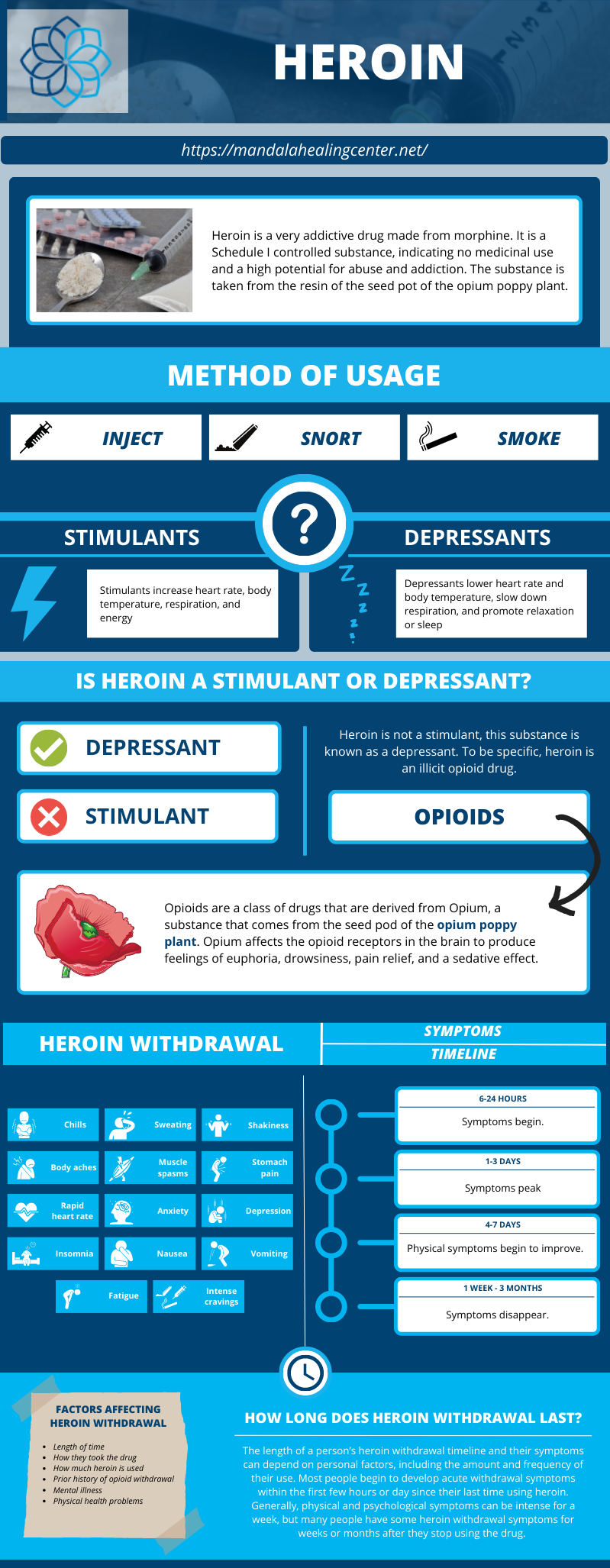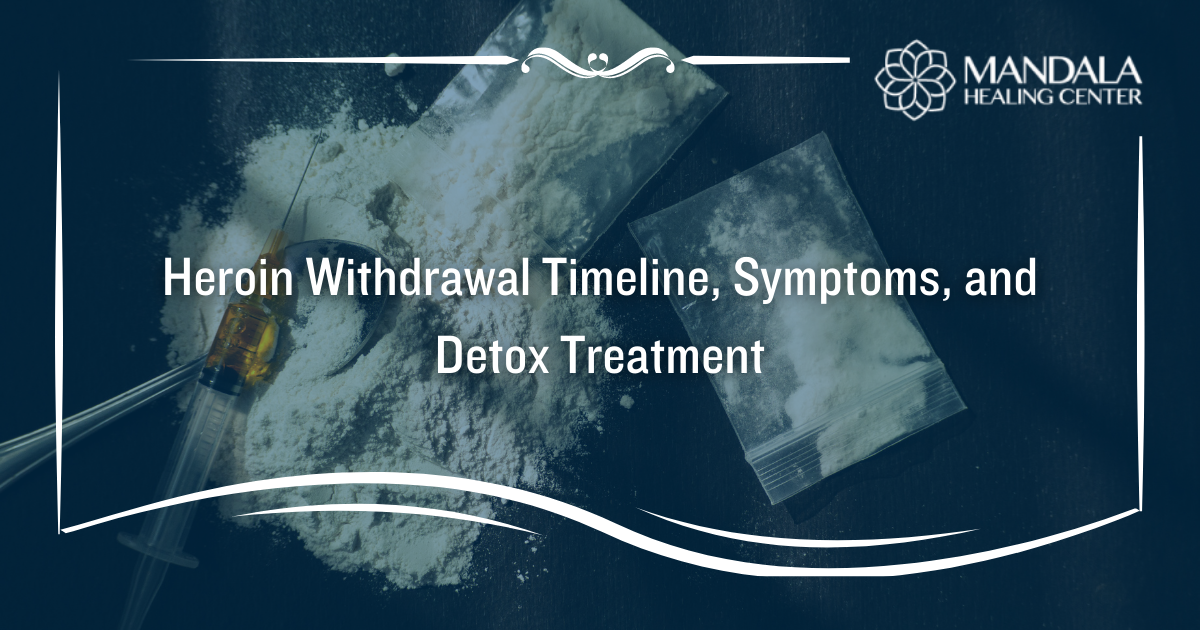Heroin is a potent, highly-addictive opioid drug. People who use heroin for a short period can quickly develop a life-threatening addiction that can be incredibly challenging to overcome.
Recovery is possible if the person receives comprehensive treatment and ongoing support. For most, medically-supported detox is the first step of a comprehensive treatment program.
Knowing what is likely to happen during each stage of the heroin withdrawal timeline can help prepare you for what will come next and help you feel more confident when making decisions about your care.

What Are Common Heroin Withdrawal Symptoms?
Your withdrawal experience generally depends on various factors, including the amount of the drug you used, physical and mental health, gender, and other characteristics. The length and severity of a person’s heroin withdrawal symptoms may vary, but most people experience common symptoms. These include:
- Chills
- Sweating
- Shakiness
- Flu-like body aches
- Muscle spasms
- Stomach pain or cramping
- Rapid heart rate
- Anxiety
- Depression
- Insomnia
- Nausea and vomiting
- Fatigue
- Intense cravings
Many people find heroin withdrawal symptoms so excruciating that they relapse–return to heroin use after a period of sobriety–before having a complete detox from the drug.
Understanding the Heroin Withdrawal Timeline
Throughout a period of heroin abuse, your body adapts to the presence of the drug. When you stop using heroin, you will likely experience a range of heroin withdrawal symptoms.
Generally, people experience symptoms on the following timeline:
6-24 Hours
The onset of physical symptoms begins soon after the last time a person uses heroin. Tremors, sleep disturbances, muscle aches, tremors, and intense cravings are common.
1-3 Days
For many, the peak of physical symptoms occurs during the first three days of withdrawal. Nausea and vomiting can develop at this stage.
4-7 Days
Psychological symptoms like anxiety, insomnia, and depression continue as physical symptoms begin to improve.
1 week-3 months
Insomnia, depression, anxiety, and cravings may linger for weeks or months. Physical symptoms disappear or get much less intense.
In rare cases, people may develop a condition called Post Acute Withdrawal Syndrome (PAWS)–a severe complication of heroin withdrawal. Although it is rare, PAWS causes significant disruption to people’s lives. People with PAWS experience heroin withdrawal symptoms for months or years. Typical PAWS symptoms include:
- Cravings
- Irritability and mood swings
- Insomnia
- Depression
- Anxiety
People who develop PAWS require ongoing support and treatment to manage this condition and avoid relapse.
Most people who attempt to stop using heroin on their own are unsuccessful. Going through withdrawal under medical supervision is the best way to ensure you have a safe, complete detox from heroin.
How Long Does Heroin Withdrawal Last?
The length of a person’s heroin withdrawal timeline and their symptoms can depend on personal factors, including the amount and frequency of their use. Most people begin to develop acute withdrawal symptoms within the first few hours or day since their last time using heroin. Generally, physical and psychological symptoms can be intense for a week, but many people have some heroin withdrawal symptoms for weeks or months after they stop using the drug.
Many factors can change the length and intensity of a person’s heroin withdrawal symptoms. These include:
- The length of time they used heroin
- How they took the drug–snorted, smoked, or injected
- How much heroin they typically used
- Prior history of opioid withdrawal
- Mental illness
- Physical health problems
Frequent, heavy heroin use may lead to longer, more intense withdrawal periods, while people who used the drug in smaller amounts or less frequently may experience less intense withdrawal periods.
What Happens During Heroin Detox?
Addiction treatment specialists tailor treatment plans to address each person’s unique needs and goals. Generally, addiction treatment usually happens in stages. Detox is the first step of addiction treatment and provides people with the support and care to get through withdrawal safely.
Detox begins with an assessment. During this assessment, a doctor or addiction specialist will ask for information about your health and substance abuse, including:
- How much heroin you used
- How often you used it
- Other drugs you used at the same time
- Medical problems
- Mental health history
- Prior substance abuse treatment
This assessment will allow your treatment team to develop a plan to meet your individual needs and help you set and achieve personal goals related to recovery.
During the heroin detox process, medical and support staff will monitor your withdrawal symptoms and treat them with evidence-based and holistic therapies, including:
- Medications such as buprenorphine or methadone for physical and emotional discomfort
- Emotional support, including individual therapy
- Holistic treatments like nutrition support, massage, exercise, and mindfulness, when appropriate
- Distance from triggers
Having the support of a holistic heroin detox program can give you the best chance at having a safe, complete detox.
After completing detox, you must continue participating in a treatment program that can give you the support, care, and skills you need to manage your addiction and learn how to prevent relapse. Treatment plans often include therapy, education, mental health treatment, medications, and holistic therapies. Addiction is never truly cured, but you can manage its symptoms and live a healthy, sober lifestyle.
Find a Heroin Detox Center in South Florida Today
No one chooses to live with addiction, but you can choose to treat it. Reach out to the Mandala Healing Center specialists today to learn about starting one of our holistic detox or treatment programs in West Palm Beach, FL. Our board-certified physicians and world-class clinical team are ready to help patients struggling with a wide variety of substances, including opiates like heroin, and other drugs like methamphetamine, benzodiazepine, and illicit substances.
The Mandala Healing Center understands that addiction presents differently with each patient, as each substance affects individuals in unique ways. After a careful assessment of each patient’s history and patterns of drug use, a personalized detoxification plan is developed. Once the physical addiction is treated, healing can then begin.
Call today to speak with a qualified admissions coordinator about starting your recovery.












